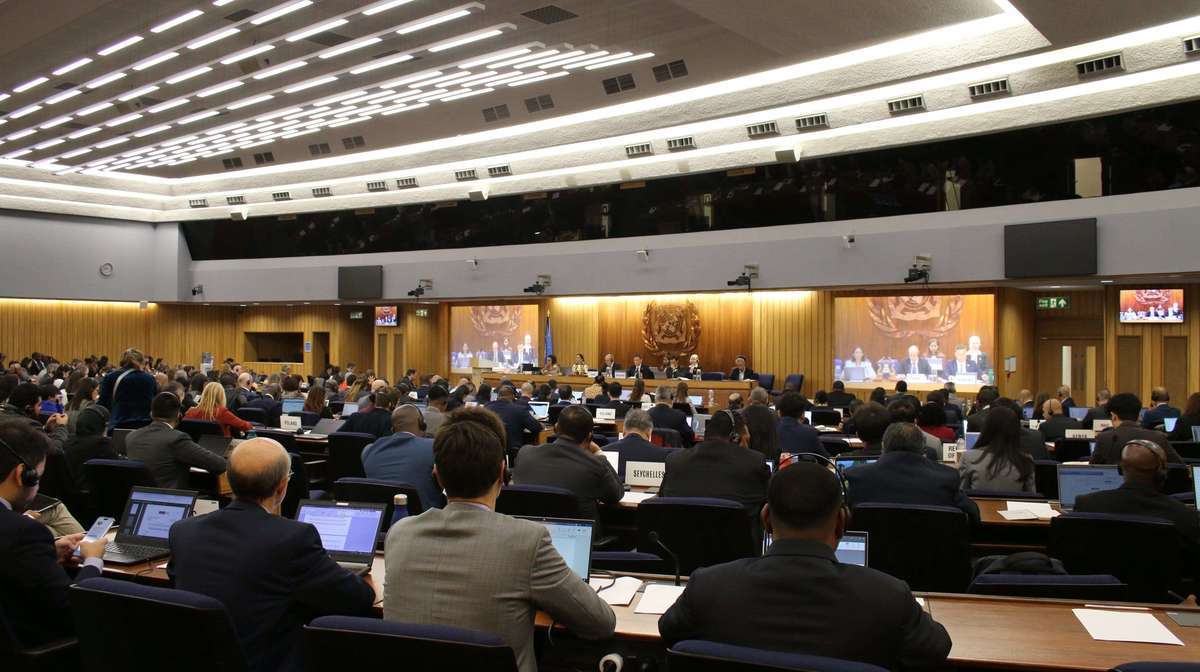Universal GHG levy gains support, but progress stalls at the IMO
61 out of 109 countries that have ratified MARPOL Annex VI now endorse a universal greenhouse gas (GHG) levy.
 PHOTO: Representatives from member states at the IMO’s Intersessional Working Group on the Reduction of GHG Emissions from Ships meeting in London. X of @IMOHQ
PHOTO: Representatives from member states at the IMO’s Intersessional Working Group on the Reduction of GHG Emissions from Ships meeting in London. X of @IMOHQ
This means that by the end of the IMO’s Intersessional Working Group on the Reduction of Greenhouse Gas Emissions (ISWG-GHG 18) meeting, majority support shifted in favour of the levy.
MARPOL can be amended either through consensus or voting among IMO member states. If no consensus is reached, the amendment process moves to a vote. Under the voting procedure, only the 109 countries that have ratified MARPOL Annex VI - out of 176 IMO member states - are eligible to participate.
According to UCL Shipping and Oceans Research Group, part of UK's UCL Energy Institute, this level of support is crucial because a MARPOL amendment requires the approval from two-thirds (66%) of the ratifying countries. The adoption, or entry into force, of a policy can also be delayed if significant objections are raised.
“One of the bright spots of this week’s meetings was the strong participation of new voices who joined more than 60 IMO member states, calling for the inclusion of a levy for greenhouse gas emissions of the maritime sector,” said Delaine McCullough, president of the Clean Shipping Coalition.
The fact that Mexico and Panama led regional talks was deemed “particularly encouraging,” she added.
Apart from the rising support for the levy, there has been little movement at the IMO level since the Marine Environment Protection Committee (MEPC 82) meeting in October.
The UCL report highlights that countries remain divided on key aspects of the GHG levy. This includes the size of a GHG levy - ranging from $18-150/mtCO2e - and discussions about feebates, flexibility mechanisms and revenue distributions.
Oil influencers continue to oppose levy
A group of 15 countries, including oil incumbents Saudi Arabia, Brazil and Oman, oil refiner South Africa, and the world’s largest oil consumer, China, have refused to back the levy.
In a joint proposal submitted to the IMO, they argue that a levy is a “profoundly regressive measure” that will hurt developing countries, increase economic inequality and exacerbate food insecurity by raising prices for goods. The proposal also claims that a levy will be used as a “proxy for the lack of climate financing” and ultimately delay shipping’s transition to green fuels.
"Delegates must not be misled by weak, loophole-ridden alternatives that fail to hold major polluters accountable and undermine climate action," said Bastien Bonnet-Cantalloube, shipping decarbonisation expert at Carbon Market Watch.
No progress on technical measure
“While much of the discussion is focused on the levy, we are making zero progress on the global fuel standard,” said Constance Dijkstra, IMO policy manager at Transport & Environment.
The majority of ratifying countries have expressed support for implementing a global fuel standard (GFS) as a technical measure. However, there is still no consensus on crucial aspects, including the required level of emission intensity reductions, the selection of a base year for calculations, the approach to lifecycle emissions analysis, the enforcement of penalties for non-compliance and the distribution of generated revenue.
“We are less than two months away from having to make a final decision, and we still do not know how much ships will be expected to reduce their emissions, or which fuels and technologies will count as green,” Dijkstra warned.
“This is worrying, given the big push for first-generation biofuels, which are often associated with direct and indirect emissions. This huge risk is going under the radar,” she added.
The IMO member states will reconvene discussions at the 19th session of ISWG-GHG, before presenting proposals at MEPC 83 in April.
By Konica Bhatt
Please get in touch with comments or additional info to news@engine.online





